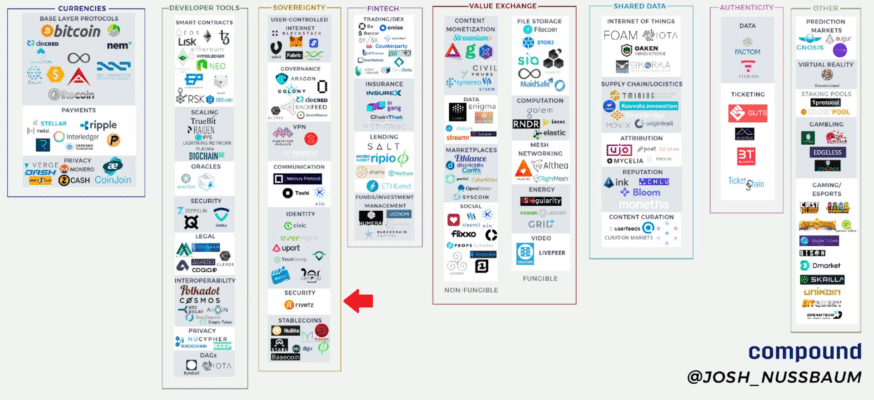What is Rivetz?
The Rivetz ecosystem approaches the cat and mouse game of cybersecurity around a hardware-based identity on individual devices. By combining the hardware-based identity provided by the TEE (Trusted Execution Environment) with the immutable attestation offered by the blockchain, Rivetz can provide an unprecedented level of certainty of intention behind each transaction.
Beyond simply using your smartphones to trade off exchanges, this level of security needs to be built into the protocol level for the inevitable future of the Internet of Things (IoT) if we want to see the future of robots paying each other come into fruition.
Simply put, you can think of Rivetz as 2FA (Two-Factor Authentication) on steroids without the hassle.
How Does Rivetz Work?
Before we start with Rivetz, we need to start with TEE (Trusted Execution Environment). Did you know TEE is within the main processor on many of the newer smartphone devices today? One of Rivetz main partner, Trustonic, is a leader in the semiconductor and digital security industry. Trustonic has already paved the way for adoption of TEE in the world’s leading mobile devices with brands such as Samsung Knox, Samsung Pay, Alipay, and Symantec. Currently, TEE is embedded in over 1 billion Android devices.
According to Wikipedia, “The Trusted Execution Environment (TEE) is a secure area of the main processor. It guarantees code and data loaded inside to be protected with respect to confidentiality and integrity. The TEE as an isolated execution environment provides security features such as isolated execution, integrity of Trusted Applications along with confidentiality of their assets. In general terms, the TEE offers an execution space that provides a higher level of security than a rich mobile operating system open (mobile OS) and more functionality than a ‘secure element’ (SE).”
Explain this to my mom, please?
You can tell Jimmy (the device you want to protect) not to accept any candies from anyone when he is outside walking home from school alone (the conditions being “outdoors” and “walking home from school alone”), but he can accept candies (allowing a transaction to occur) from anyone when he is at home. At home, he’s safe and can trust anyone there with a far higher certainty than he can outside.
Taking it back to reality, you can set the conditions to be something as complicated as: you can only transact into this exact public key if you are on the network provided by this exact router with this IP address every Saturday between 1:05 pm to 1:07 pm only while being near enough to communicate with this exact Bluetooth device.
When all these pre-determined conditions are fulfilled, the intention behind the transaction becomes trustworthy. You can use your device normally and completely unobstructed by annoying security measures such as opening a 2FA app.
The goal of Rivetz is to assert within blockchain transactions that “this device, in this condition, following these rules, made this transaction.”
Here’s a demonstration of the Rivetz patented biometric voice recognition technology.
The Utility of RvT Tokens
One thing that the Rivetz team always emphasizes on their Telegram is that they’re trying to be the golden child for utility tokens. The core utilities of RvT tokens are:
- exchanging cyber control services
- registering the reference “conditions of intentions” of the device
- verifying the integrity of the device with a cybersecurity controller
- consumation to provide a machine multisig
Team summarizes this utility of the token as “integral to delivering automated device-to-service or device-to-device payment for the consumption of the cybersecurity service” as stated in the whitepaper.
Partnerships
Other than the essential partnerships with Trustonic mentioned above, Rivetz has over a dozen other partnerships. Some of the more noteworthy ones are the US Department of Homeland Security, Parity (founded by Gavin Wood), Telefonica ($41.88B market cap), Trusted IoT Alliance, and the National Cybersecurity Center of Excellence.
Exchanges
One interesting area Rivetz can excel at is improving the security of centralized exchanges. As hackers commonly target exchanges, Rivetz can provide valuable security enhancement for them all. In fact, they’re in discussions with a number of exchanges to help with their security.
Competition

Source: John Nussbaum (11/14/17)
There is currently little to no competition within this niche in the entire blockchain ecosystem. A surprising fact since security is a major benefit blockchain technology can provide.
Trading history
RvT hit its all-time-high price of 3.78 USD and reaching nearly a 100 million total market cap on the 7th of January during the altcoin festival during that month. It has since gone down and hit the floor of 6000 sats twice. Like many altcoins in late Q1 2018, it’s holding a Christmas sales at the moment.
Where to Buy Rivetz
RvT is available at on the centralized exchange, HitBTC, and decentralized exchanges such as EtherDelta, IDEX, and Radar Relay.
Where to Store Rivetz
RvT is an ERC-20 token so you can safely store it in all Ethereum compatible wallets such as MyEtherWallet, Ledger Nano S, Trezor, MetaMask, Parity and many others.
Conclusion
With the simple message of “increased security leads to increased possible value on-chain” and treating “security as a quality rather than as an afterthought protection”, security implementations such as the one being proposed by Rivetz is essential for the whole blockchain industry if we want the future of our economy to truly be tokenized. We must build in security at the hardware level. With trust and improved quality of each transaction, the on-chain ceiling value will naturally raise.
The post What is Rivetz (RVT)? | A Beginner’s Guide appeared first on CoinCentral.

Coincentral.com is author of this content, TheBitcoinNews.com is is not responsible for the content of external sites.
Our Social Networks: Facebook Instagram Pinterest Reddit Telegram Twitter Youtube










